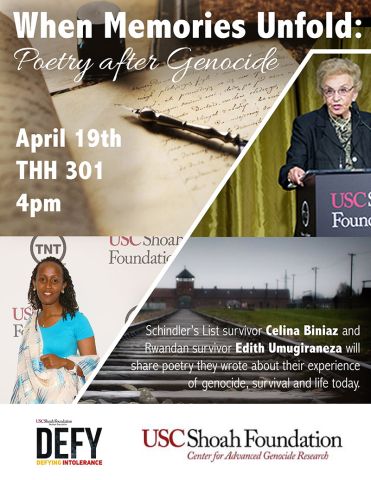
Filter by content type:
Filter by date:
Rwandan Tutsi Genocide survivor Edith Umugiraneza describes her first contact with the Interahamwe militia, which was threatening violence against Tutsis.
In an effort to create a deeper engagement with educators online, USC Shoah Foundation’s IWitness hosts Twitter chat's on the 2nd and 4th Wednesday of every month. Meet fellow IWitness educators, ask questions directly to the IWitness team and join the IWitness community.
Follow the IWitness twitter account @USCIWitness and to join the chat follow and send tweets with #IWitnessChat.

In honor of Genocide Awareness Month. join USC Shoah Foundation’s Student Organization DEFY and USC Shoah Foundation Center for Advanced Genocide Research for “When Memories Unfold: Poetry After Genocide.”
April 7, 2016 marks the 22nd anniversary of Kwibuka, the official anniversary of the Genocide against the Tutsi in Rwanda. From April to July 1994, one of the most brutal genocides in human history occurred in Rwanda. It claimed the lives of 800,000 men, women, and children, most of whom were of Tutsi descent.
To help introduce your students to the Genocide against the Tutsi in Rwanda explore testimonies and activities in IWitness.
While the average USC student was dragging themselves out of bed to make it to their first class after Spring Break, I was--rather jet-lagged--sitting in an 800 year old room cloaked in paintings of old intellectuals and world renowned writers in a tiny corridor of Hertford College at Oxford University, wondering how on Earth I could be so lucky to miss a week of school to hang out at one of the oldest, most prestigious centers of learning in the history of Western Civilization.
Pagination
- Previous page
- Page 78
- Next page